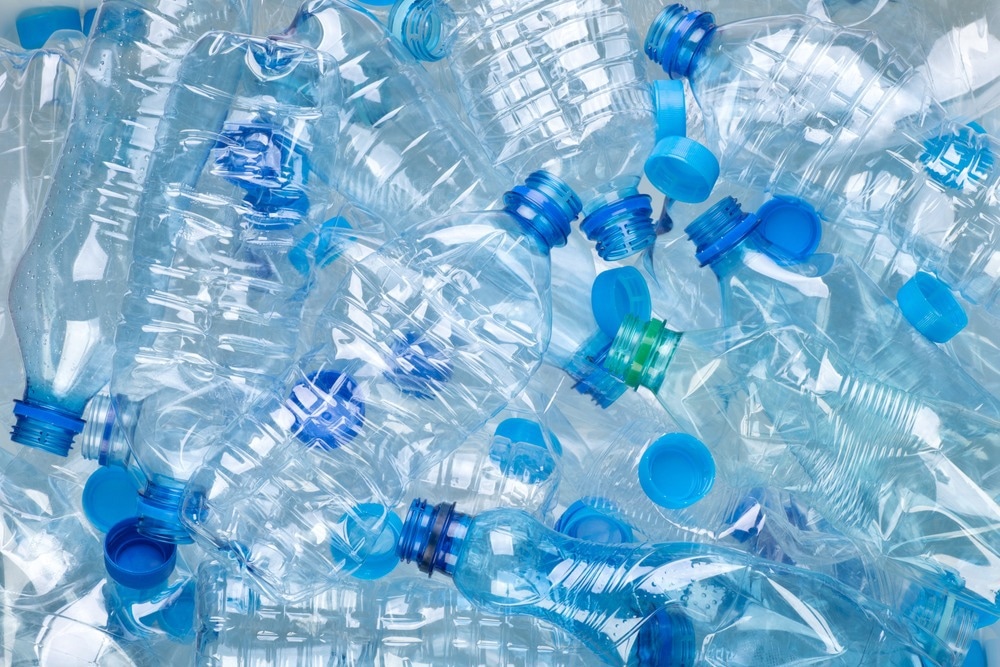In this article, AZoRobotics explores how robots could be used to tackle plastic waste through b:bot’s bottle recycling robots.

Image Credit: photka/Shutterstock.com
Why is Plastic Pollution Such a Problem?
It is estimated that around 10% of global plastic pollution comes from plastic bottles. Plastic pollution presents a major threat to humanity and the world we live in. It negatively impacts our health, contaminates the environment, and threatens the world’s oceans and wildlife.
Most plastic bottles produced (90%) end up as waste, and most plastic bottles are not recycled. This is a problem because the increasing production of plastic products is increasing global plastic pollution. As well as the detrimental impact plastic pollution has on the environment, human health, and the economy, a growing body of research has revealed the significant problem of microplastics - small particles of plastic that form as the material slowly degrades, contributing to health problems in humans and animals.
Recent research has revealed that microplastics are present in the human body, with one study finding that almost 80% of participants studied had microplastics in their blood. Another study has found evidence of microplastic becoming lodged in human organs, such as the lungs. While the full extent of the impact of microplastic on the body is not clear, all signs indicate that it is likely damaging to health.
It is important that plastic products, such as plastic bottles, are recycled and not thrown out as waste. There are many challenges, however, that are currently preventing plastic bottle recycling facilities from being more widespread.
Problems in establishing efficient collection services to transport plastic bottles to recycling facilities, the lack of available plastic bottle recycling infrastructure, contamination issues (materials other than plastic that reduce the quality of the recycled plastic), and problems with sorting different types of plastic bottle are the major challenges currently facing the plastic bottle recycling industry.
French plastic recycling robotics company b:bot has developed an innovative solution to these problems.
Who is b:bot?
b:bot is a French start-up company that combines robotics and artificial intelligence (AI) to recycle plastic bottles. The company aims to make recycling an integral part of daily life with its novel solution, a terminal where consumers deposit their bottles and watch them instantly shredded. The consumer is incentivized to use the terminal via the choice of financial reimbursement for their recycled bottles or the option to donate their reward to charity.
b:bot is helping to support a sustainable future; its activity meets several Sustainable Development Goals, including number 11 (sustainable cities and communities), 12 (responsible consumption and production), and 14 (life below water).
How are Robotics Used in b:bot’s Plastic Bottle Recycling Solution?
b:bot’s terminals have already emerged in airports, supermarkets, and other companies. The company can benefit economically from the resale of the plastic, helping to establish a self-financing system that overcomes many of the current challenges facing plastic bottle recycling, such as bottle collection, logistics, and infrastructure issues.
Robotics are used to instantly tear plastic bottles into small plastic flakes. Bottles added into the terminal are instantly shredded, which increases the terminal’s storage capacity compared with conventional recycling terminals. This improves the carbon footprint of transporting the recycled material, thus further increasing the solution’s sustainability.
France has around 500 robotic terminals already installed, which have recycled over 130 million bottles.
How Does b:bot Compare to Other Solutions on the Market?
b:bot is not the only innovation operating in this space. Several other companies have developed ‘reverse vending machines’ that work on the same principle of incentivizing consumers to bring bottles to the terminals to be recycled. Norwegian company Tomra, UK company EcoVend, and Germany’s famous Pfand system all operate similarly.
b:bot differentiates itself via its integration of AI which helps to further improve its carbon footprint and sustainability. Using AI, b:bot can reduce the volume of plastic by 90%, allowing more plastic to be stored on-site before it needs to be transported. By reducing the volume of plastic, b:bot is able to eliminate several steps that are necessary with traditional plastic bottle recycling systems.
A New Development for b:bot
Recently, b:bot raised €20 million in investment from Eiffel Investment Group and Crédit Agricole Normandie-Seine Participations. With this sizable investment, the company plans to double its number of robotic terminals by the end of the year. The money will likely help facilitate both the production and roll-out of new terminals as well as contribute to continuing research and development to further progress the technology.
The company also has its sights set on expanding internationally and will likely use some of its recent investments to expand into new markets. Already, b:bot has been rolled out in Portugal and it has plans to expand into Tunisia and the United Arab Emirates in the near future.
Finally, b:bot also hopes to expand its recycling capabilities by using its technology to take on can recycling. In the future, it is possible that b:bot will become a major player in collection and recycling solutions, particularly as it aims to expand into new markets and develop its technology to recycle different materials.
References and Further Reading
b:bot [online]. b:bot. Available at: https://b-bot.com/
Alston, F. (2023). French plastic recycling robotics company b:bot raises €20 million to double its robot network and accelerate international expansion [online]. Tech EU. Available at: https://tech.eu/2023/07/10/french-plastic-recycling-robotics-company-b-bot-raises-20-million-to-double-its-robot-network-and-accelerate-international-expansion/
Plastic Pollution [online]. United Nations Environment Programme. Available at: https://www.unep.org/plastic-pollution
Rachel Ramirez. (2023). The plastic water bottle industry is booming. Here’s why that’s a huge problem [online]. CNN. Available at: https://edition.cnn.com/2023/03/16/world/plastic-water-bottles-un-report-climate/
Disclaimer: The views expressed here are those of the author expressed in their private capacity and do not necessarily represent the views of AZoM.com Limited T/A AZoNetwork the owner and operator of this website. This disclaimer forms part of the Terms and conditions of use of this website.